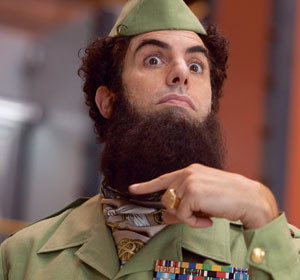

Sacha Baron Cohen‘s resemblance to an elongated Charlie Chaplin may be a key to The Dictator; he’s a funny figure but a chilly one. The Dictator also borrows from Chaplin’s A King in New York, with its hereditary monarch stranded in the city. And Cohen has, as critic Robert Warshow wrote of Chaplin, a cold heart visible in the most genial moments—never more so than with his newest character.
Working with his regular collaborator Larry Charles, Cohen uses actors instead of candid-camera victims. (There may be no place left, even Kazakhstan, where they don’t recognize Sacha Baron Cohen.) As with the trans-Danubian weirdo Borat and the German fritillary Bruno, Cohen’s Admiral-General Aladeen is a character he’s been soaking in for years. A bullying, dialect bit like this should be wearying, but Cohen’s plasticity and strikingly able physical comedy keep The Dictator rich.
Aladeen is the second-generation ruler of the oil-rich North African nation of Wadiya. His uniform jacket is heavy with self-awarded chest-candy. But he loses power because of his scheming advisor (Ben Kingsley), who plans to use a goat-herding simpleton look-alike to replace Aladeen at a U.N. speech.
In New York, a right-livelihood girl named Zoey rescues the shaved and unrecognizable Aladeen. A Vespa rider with a strictly functional short haircut, Zoey operators a Brooklyn health-food store called the “Free Earth Collective.”
Of all the decisions Charles and Cohen made, the smartest was hiring Anna Faris, the succulent, shocked, put-upon doll—so tiny and yet such a rare stooge. Faris rose to stardom being clobbered with things in the Scary Movie series, and she stands up bravely to all the insults Aladeen hurls at her, such as when he describes Zoey as “a little boy in a chemo wig” or “a lesbian hobbit.”
Much of the comedy is straight-out appalling, always low, sometimes hilarious. Particularly terrific is one scene of an unbilled Kathryn Hahn being aided in childbirth by the dictator. Aladeen’s temporary distraction with his cell phone interferes with the delivery. The gag ends with the problem of exhibiting a baby, Lion King-wise, when it’s still umbilical-corded to its mom.
Past Cohen films were about rubes being embarrassed. The laughter is easier with professional foils. Bobby Lee plays a disgusting Chinese oil minister. Jason Mantzoukas is Nadal, the nuclear scientist Aladeen had ordered killed, now working as an Apple-store Genius: “That means I clean semen out of laptops.”
Nadal is the only one allowed to match Aladeen in an argument, and he shares The Dictator‘s best scenes: the two in a tourist helicopter being mistaken for terrorists.
If The Dictator seems episodic, that’s just because of the way comedy films are made in this decade. Improv-and-cut is for comedy what slash-and-burn is for agriculture. The method has been around for a while; the five-hour rough cut of This Is Spinal Tap shows how much got left on the floor in what turned out to be a comedy classic.
A film like The Dictator, however, which consists of nothing but funny (or at least outrageous) bits, is also a film in which the characters aren’t really connected to each other. They seem to be bumping into each other by chance. The relationships start from scratch a lot, which may be why Zoey never really tells off this war criminal and means it.
We are actually meant to envy the outlandishly vulgar playboy, who can order an execution just by touching a finger to his own throat. In the finish of The Great Dictator, Chaplin appealed “in the name of democracy” to a world at war. Cohen’s final speech is an inversion: a parody, calling out democracy for its multiple failures during the War on Terror.
The crowd laughs, but it’s not that Cohen expects them to do anything. We’re meant to admire the bastard. Cohen’s found the sympathy for a fascist in the viewers—far more so here than you’ll see in any of the superhero movies this summer.
R; 83 min.



